June 13, 2025 | 08:07 GMT +7
June 13, 2025 | 08:07 GMT +7
Hotline: 0913.378.918
June 13, 2025 | 08:07 GMT +7
Hotline: 0913.378.918
On June 11, Deputy Prime Minister Tran Hong Ha chaired a meeting to discuss a proposal for establishing a center for agricultural chain, production, processing, and consumption in the Mekong Delta region, located in Can Tho City. This initiative is part of Resolution 45/2022/QH15 of the National Assembly, which pilots specific mechanisms and policies for Can Tho - the economic, scientific, technological, and cultural hub of the entire region.
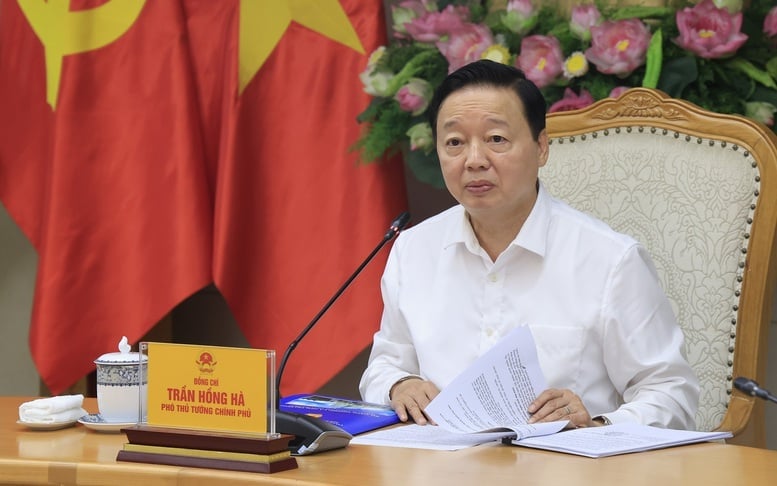
Deputy Prime Minister Tran Hong Ha chairs a meeting to discuss the proposal for establishing the Center for agricultural linkage, production, processing, and consumption in the Mekong Delta region. Photo: Minh Khoi.
Speaking at the meeting, Deputy PM Tran Hong Ha emphasized the need to clearly define the organizational model, functions, responsibilities, and operational mechanisms of the Center to effectively address bottlenecks in the modern agricultural value chain of the Mekong Delta region.
"We must clarify what belongs to the private sector and what the role of the State is. We cannot allow localities or ministries to remain confused in implementing a Resolution that has already been approved by the National Assembly," the Deputy PM stated.
Accordingly, the Center will operate as a multi-functional complex following the "one-stop shop" model. It will not only serve as a hub for the production, processing, and consumption of agricultural products, but also function as a center for logistics, technological research and application, training, knowledge transfer, product commercialization, and international market connectivity.
According to the proposal from the Ministry of Agriculture and Environment, the Center will consist of two main zones. Zone 1, covering approximately 50 hectares, will host administrative units, support services, commercial facilities, logistics, and supply chain infrastructure. Zone 2, covering 200 hectares, will be designated for technological research, advanced agricultural processing, accommodation for experts and workers, waste treatment, and other utilities as specified in the detailed planning.

Deputy Minister of Agriculture and Environment Tran Thanh Nam. Photo: Minh Khoi.
The Center will integrate all key links in the modern agricultural value chain: raw material production, supply of inputs and equipment, processing, inspection, packaging, logistics, warehousing, trading, and import-export. The goal is to promote an efficient production model with strong linkages among enterprises, cooperatives, and farmers.
A highlight of the Center is the regional cold storage system, capable of preserving harvested agricultural products for up to 90 days, 13 times longer than the current average. This solution not only enables farmers to better manage their selling time, but also helps businesses stabilize raw material supplies, thereby reducing the recurring issue of "bumper crops, plummeting prices."
Participants at the meeting agreed that enterprises should be the primary investors and operators of the Center. Meanwhile, the State will play a facilitating role by developing institutional frameworks and investing in key infrastructure such as irradiation systems, quarantine facilities, laboratories, and research on crop varieties.
Deputy Minister of Science and Technology Le Xuan Dinh proposed that the Center should take on functions with high technological value, including quality inspection, standardization, international certification, and modern logistics. He also emphasized the need to integrate e-commerce, international trade, regional trading hubs, and agricultural commodity exchanges into the Center's operations.
Deputy Minister of Finance Bui Van Khang stressed the importance of public-private partnerships: “The State should focus on essential technical infrastructure, while enterprises will be responsible for operation, exploitation, and commercialization. The Center must connect not only to domestic markets but also to international ones such as Cambodia, Thailand, and China.”
Mr. Ho Xuan Hung, Chairman of the Vietnam General Association of Agriculture and Rural Development, proposed the establishment of a clear socialization mechanism, selecting leading enterprises with the capacity and commitment to link closely with farmers.
According to Deputy Minister of Agriculture and Environment Tran Thanh Nam, the proposal for the Center is based on international wholesale market models that integrate production, processing, consumption, logistics, trade, and finance. Can Tho has been chosen as the location for the Center, as it accounts for 40% of the Mekong Delta's rice and pangasius processing capacity, and offers a well-developed transportation network by road, waterway, and air.
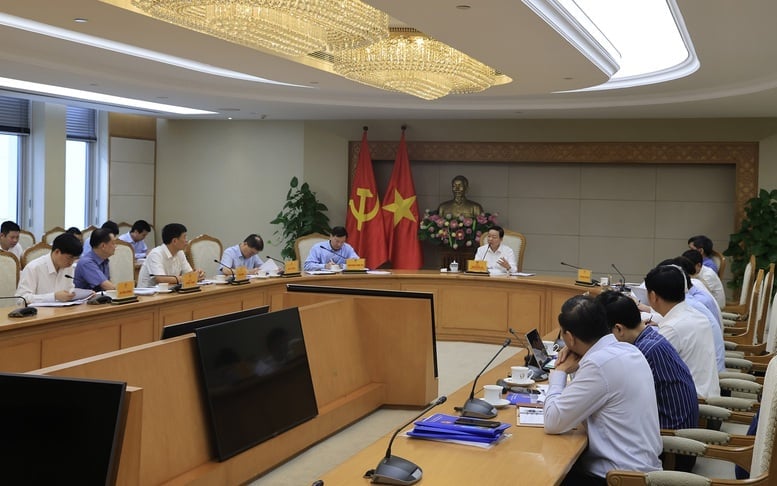
A general view of the meeting. Photo: Minh Khoi.
Deputy PM Tran Hong Ha affirmed that Can Tho city has full authority to establish the Regional Agricultural Center under Resolution 45, without needing additional approval from central government agencies. He emphasized that Can Tho must proactively develop its own investment project, clearly defining the responsibilities of local authorities, central ministries, and private enterprises. Socialized components should be handed over to the private sector, while foundational infrastructure must be publicly funded.
“In terms of policy mechanisms, we must clearly separate the roles of the public and private sectors. Some components may be publicly funded but privately operated, and vice versa,” the Deputy PM stressed.
The Center is not only envisioned as a hub for production, processing, and marketing of agricultural products, but also as a strategic regional trading point. Pilot initiatives such as a commodity exchange for agricultural goods, a national rice reserve warehouse, and integration with Halal and international markets will help expand export opportunities for Vietnamese agricultural products, enhance market regulation capacity, and ensure food security amid global volatility.
Regarding organizational structure, ministries such as Agriculture and Environment, Industry and Trade, Science and Technology, Finance, and Justice will collaborate with Can Tho City to establish government service units at the Center, including customs, banking, quarantine, and public administrative services. Additionally, the government will establish a multidisciplinary advisory body to support investors in matters related to legal, technological, and commercial aspects.
“If done right, this will not only be a project for Can Tho or the Mekong Delta, but a major breakthrough for modern Vietnamese agriculture to enter the global market,” Deputy Prime Minister Tran Hong Ha affirmed.
Translated by Phuong Linh

(VAN) Gia Lai province has recently recorded 460 rare species of animals and plants, contributing to forest conservation and biodiversity planning in the region.

(VAN) Ms. Caroline Beresford, New Zealand Ambassador to Vietnam, expressed confidence that agricultural cooperation between Vietnam and New Zealand will develop sustainably, be climate-resilient, and promote gender equality.

(VAN) Vietnam reaffirms its commitment to international cooperation in fostering sustainable and responsible fisheries while ensuring resilient livelihoods for small-scale fishing communities.
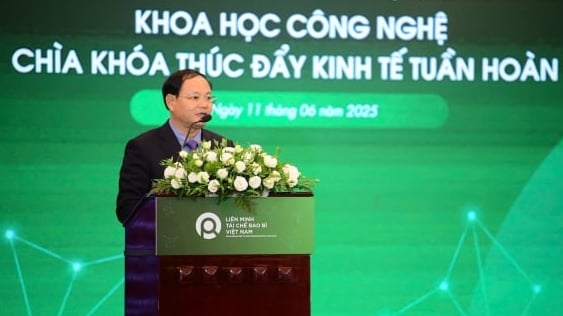
(VAN) More than just a technical solution, science and technology are gradually becoming a cornerstone in Vietnam’s journey toward building a circular economy.
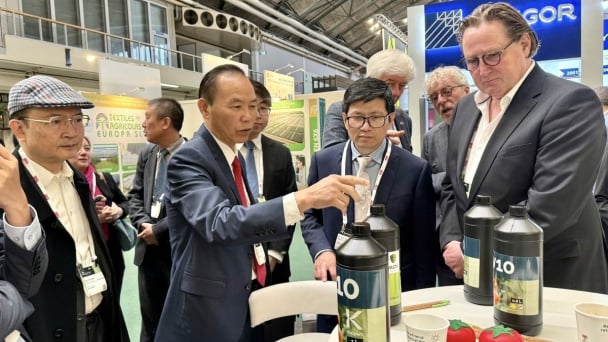
(VAN) The Netherlands is ready to accompany Vietnam in building a green, circular, and sustainable agriculture sector that is resilient to climate change.
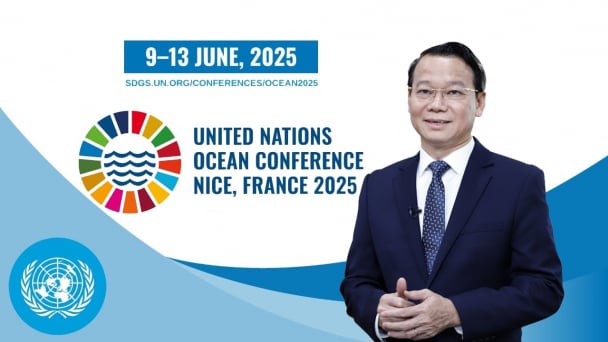
(VAN) Minister Do Duc Duy affirmed Vietnam’s 6 strategic goals, prioritizing on conserving ocean ecosystems in tandem with developing a blue marine economy.